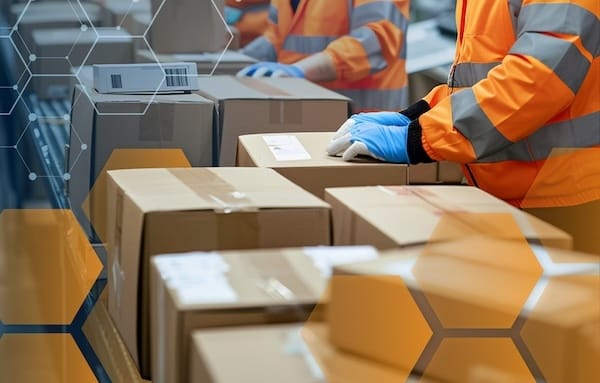- Warehouse Wisdom. Weekly.
- Posts
- Warehouse Wisdom. Weekly. 12/20/2024
Warehouse Wisdom. Weekly. 12/20/2024
Only the most relevant news for SMBs to improve logistics – picked, packed, and delivered without the bias.

Happy Friday!
If you thought your week couldn’t get any weirder, here’s a curveball: the Houthis are apparently pivoting from armed conflict to webinar hosting. It seems they’ve discovered the lucrative allure of virtual events, and now they’re contemplating a Red Sea security summit. Given all of the violence, truly, not funny.
Meanwhile, across the pond, the UK is facing a crisis of epic proportions: a Guinness shortage. Yes, pub patrons are reportedly being forced to drink other beers while this vital supply chain issue wreaks havoc on the nation's emotional stability. Between this and Brexit, it’s clear the British public can’t catch a break. Raise a glass of whatever’s left, folks; the dark days are upon us.
But the news doesn’t stop there. Stick around as we dive into this week’s updates, including flirting with a USPS privatization, Canada Post dusting itself off, eye-watering truck congestion costs, an Amazonian double whammy, the Super Saturday shopping blitz, and more. Let’s get into it—before we all need a pint of something stronger.
Freight and Shipping
Postal pain, surcharge mania, and $109 billion in traffic troubles

It seems the USPS is once again in the spotlight, and not for its commemorative stamp designs. The President-elect is reportedly exploring the option of privatizing the Postal Service. The idea is generating the usual mix of debate: efficiency enthusiasts are intrigued, while others are wondering if this means their mail will arrive via “Surge-Priced Post.” Stay tuned to see how this unfolds in 2025.
North of the border, Canada Post workers are back on the job after a government-mandated return, but don’t expect your packages anytime soon. The agency has already issued a preemptive "sorry" as it braces for delays stretching well into 2025. Canadians are known for their patience, but even maple syrup doesn’t flow this slowly.
Meanwhile, UPS and FedEx are treating surcharges like a game of “anything you can do, I can do pricier.” UPS plans to hike SurePost rates and add delivery area surcharges, while FedEx is tacking on inbound import fees and—you guessed it—more delivery area surcharges. Essentially, if you live anywhere not hugging a major distribution center, your package will now come with its own price tag. Rural customers, beware.
And the trucking industry has hit a new milestone, and not the kind worth celebrating—congestion costs have skyrocketed to a record $109 billion. Yes, billion with a “B.” While trucks idling in traffic may feel like the soundtrack to modern logistics, this staggering price tag is a not-so-gentle reminder that inefficiency has real costs. Between rising fuel expenses, delayed deliveries, and drivers contemplating their career choices at a standstill, there are a host of challenges to address in the future.
2025 Prediction: A Surge of Self-Serve CTV Buyers
Roku predicts that 2025 will be a breakthrough year for self-serve CTV advertising. Roku Ads Manager makes it easy to integrate CTV into your 2025 marketing mix. Easily segment your target audience, optimize campaigns in real-time, and drive conversions with interactive ad formats and shoppable ads with a Shopify integration. Roku Ads Manager makes CTV advertising accessible and impactful for businesses of any size.
Warehouse Operations
Amazon’s holiday wishlist: fewer strikes, fewer probes, and maybe a small break

Amazon is finding itself on the naughty list this holiday season, facing both a Senate probe into unsafe work conditions and the looming threat of worker strikes. It’s a classic "double whammy"—or as Amazon might call it, Tuesday. The probe aims to shed light on safety issues within the company’s operations, while the strikes could disrupt the seamless delivery empire we’ve all come to rely on. Let’s just say it’s not the kind of two-day shipping drama they wanted headlining their December.
And speaking of strikes, the waiting game is over—they’ve officially begun. Workers, led by the Teamsters, are hitting the picket lines just in time for the peak gift-giving season. It’s a bold move to remind the world that labor isn’t just a line item on a balance sheet. For shoppers, this might mean reevaluating last-minute Prime orders. For Amazon, it’s yet another logistics headache in a season already fraught with challenges. The timing is impeccable—if you’re trying to make a point, that is.
Logistics Vitals
The lifeline keeping 3PLs alive amid rising costs

Ecommerce continues to be the MVP for third-party logistics (3PLs), driving substantial growth even as the industry wrestles with challenges like rising costs and labor shortages. Amid these hurdles, 3PLs are finding opportunities in the relentless demand for online shopping fulfillment.
70% of 3PL executives identified ecommerce as the primary driver of revenue growth in 2024.
86% of 3PLs said their WMS was a critical part of their tech stack.
70% of 3PLs grew order volume year over year but the gains were down from previous years.
B2B fulfillment was the largest source of orders for 3PLs, though e-comm is growing.
Online Marketplaces
Walmart, TikTok, and the Super Saturday surge

Walmart is doubling down on its Chinese e-commerce ambitions by teaming up with delivery giant Meituan. With Meituan’s extensive delivery network, Walmart is poised to compete in the cutthroat Chinese market, where even a missed delivery window could be the difference between winning and losing a customer. It’s a bold move to stay relevant in a country where online shopping feels less like a convenience and more like a national sport.
Meanwhile, TikTok finds itself in a classic "one step forward, two steps back" scenario. On the one hand, its U.S. popularity is skyrocketing, particularly with its TikTok Shop platform, which is now outpacing Shein in consumer spending. On the other hand, the app’s very existence in the U.S. is being questioned—again. Perhaps we’ll know more January 10th, when the legal arguments continue.
As TikTok’s fate hangs in the balance, U.S. retailers are bracing for the annual Super Saturday rush—the last big shopping day before Christmas. With millions of procrastinators descending on stores, logistics networks are stretched thin, trying to keep shelves stocked and delivery windows open. For retailers, it’s a race to close out the season strong. For everyone else, it’s a battle to find a parking spot and, possibly, the will to fight for that last discounted air fryer.
Ocean Freight
The 2025 logistics preview we didn’t ask for

If your supply chain relies on the Panama Canal, brace yourself: surcharges are incoming. Starting in January 2025, ocean carriers will implement fees to offset canal-related delays and increased operating costs. For companies shipping from Southeast Asia to the U.S. East or Gulf Coasts, this means budgets will need some recalibration—or perhaps just a bit of resignation. After all, the supply chain world’s unofficial motto is “costs always find a way.”
Meanwhile, back on land, consumers are dusting off their stockpiling instincts, sparked by tariff uncertainties and supply chain jitters. Remember the pandemic rush for toilet paper and canned beans? Well, it’s not quite that bad—yet. But the uptick in panic buying is enough to keep retailers and warehouse operators on edge. For the rest of us, it’s a gentle reminder: when supply chains get bumpy, people get grabby.
Warehouse Quick Deliveries
Grubhub’s fine, Alibaba’s shift, and FedEx’s freight spinoff
Grubhub to pay $25 million for deceptive practices.
Alibaba ditches Intime Stores in favor of e-commerce.
“A privatized Postal Service would have a substantially lower cost structure, be able to adapt to changing customer needs and make business decisions free from political interference, and have access to private capital markets to fund operational improvements without burdening taxpayers.”

